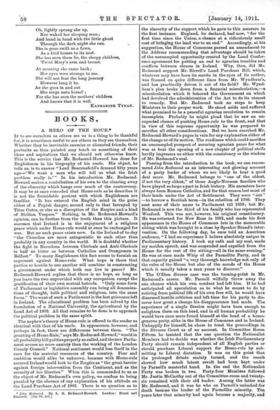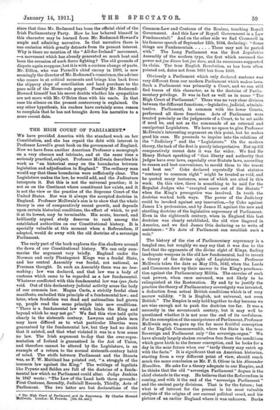BOOKS.
A HERO OF THE HOUR.* IF to see ourselves as others see us is a thing to be thankful for, it is sometimes useful to see others as they see themselves. Whether they be inevitable enemies or alienated friends, their portraits as thus painted may teach us something of their ideas and aspirations that we should not otherwise know. This is the service that Mr. Redmond-Howard has done for Englishmen in his biography of his uncle. His object, he tells us, is to answer "Lord Beaconsfield's demand fifty years ago—' We want a man who will tell us what the Irish problem really is." In his introduction Mr. Redmond- Howard makes a contribution of his own to the clearing away of the obscurity which hangs over much of the controversy. It may be at once conceded that Home-rule as he describes it is not the formidable portent with which Englishmen are familiar. "It has entered the English mind in the guise either of a Popish danger, second only to that betrayed by Titus Oates, or else as a disruption of the Empire and a kind of Sicilian Vespers." Nothing, in Mr. Redmond-Howard's opinion, can be further from the truth than this picture. It assumes that Ireland is in the enjoyment of a religious peace which under Home-rnle Would at once be exchanged for war. But no such peace exists now. In the Ireland of to-day "the Churches are more antagonistic to each other than probably in any country in the world. It is doubtful whether the fight in Barcelona between Clericals and Anti-Clericals is half so bitter as between Catholics and Orangemen in Belfast." To many Englishmen this fact seems to furnish an argument against Home-rule. What hope is there that parties so hostile to one another will combine in constructing a government under which both can live in peace ? Mr. Redmond-Howard replies that there is no hope, so long as you leave the two unprovided with any occupation except the gratification of their own mutual hatreds. " Only some form of Parliament or legislative assembly can bring all denomina- tions of thought, both political and religious, into the same focus." The want of such a Parliament is the last grievance left in Ireland. The educational problem has been solved by the foundation of a National University, the agricultural by the Land Act of 1903. All that remains to be done is to approach the political problem in the same spirit.
The nephew's theory of Home-rule is offered to the reader as identical with that of his uncle. In appearance, however, and perhaps in fact, there are differences between them. "The granting of Home Rule," says Mr.Redmond-Howard," would in all probability kill politics properly so called, and the hew Parlia- ment arouse no more anxiety than the working of the London County Council." National sentiment would lose itself in the care for the material resources of the country. Fear and ambition would alike be unknown, because with Home-rule secured Irelandwould look to the Empire as "the great barrier against foreign intervention from the Continent, and as the security of her liberties." When this is commended to us as the object of Mr. Redmond's own policy, we confess to being puzzled by the absence of any explanation of his attitude on the Land Purchase Act of 1903. There is no question as to
' John Redmond. By L. G. Redmond-Howard. London: Hurst and Blackett. [10s. 6d. net.]
the sincerity of the support which'he gave to this measure in the first instance. England, he declared, had now, " for the first time since the Union, a chance at a ridiculously small coat of briirgl#rg the land war to an end." Accordingly, at his suggestion, the House of Commons passed an amendment to the Address recommending that advantage should be taken of the unexampled opportunity created by the Land Confer- ence agreement for putting an end to agrarian troubles and conflicts between classes in Ireland. Why, then, did Mr. Redmond support Mr. Birrell's Land Purchase Bill, which, whatever may have been its merits in the eyes of its author, was framed on quite different lines from Mr. Wyndham's, and has practically driven it out of the field ? Mr. Wynd- ham's plan broke down from a financial miscalculation,—a miscalculation which it behoved the Government on which had devolved the administration of the Act to do its utmost to remedy. But Mr. Redmond took no steps to keep Ministers to their proper work. He stood aside and suffered what promised to be a peaceful agrarian revolution to remain incomplete. Probably he might plead that he saw an un- expected chance of pushing Home-rule to the front, and that in view of this supreme opportunity he was prepared to sacrifice all other considerations. But we have searched Mr. Redmond-Howard's pages in vain for any explanation either of the change or of its motive. The readiness which could sacrifice an unexampled prospect of securing agrarian peace for what was at best the opening of a new chapter of political strife hardly impresses us either with the consistency or the wisdom of Mr. Redmond's zeal.
Passing from the introduction to the book, we can recom- mend John Redmond as an interesting and glowing account of a party leader of whom we are- likely to hear a good deal more. Mr. Redmond belongs to "one of the oldest, if not the very oldest," of those Anglo-Norman families who have played so large a part in Irish history. His ancestors have always been Roman Catholics, and for that reason lost most of their lands under• the Act of Settlement. They were " out " —to borrow a Scottish term—in the rebellion of 1798. They sent none of their name to Parliament till 1859; but Mr. Redmond is now the third of his family who has represented Wexford. This was not, however, his original constituency. He was returned for New Ross in 1881, and made his first appearance in the House of Commons late in the memorable sitting which was brought to a close by Speaker Brand's inter- vention. On the following day, he once told an American audience, "I had an experience I believe absolutely unique in Parliamentary history. I took my oath and my seat, made my maiden speech, and was suspended and expelled from the House for the rest of the sitting—all in the same evening." He was at once made Whip of the Parnellite Party, and in that capacity gained "a very thorough knowledge not only of the rules of the House but also of the moods of the House which it usually takes a man years to discover."
The O'Shea divorce case was the turning-point in Mr. Redmond's career. Mr. Parnell wilfully threw away the one chance which his own conduct had left him. If he had anticipated all speculation as to what he meant to do by retiring from political life of his own free will, he would have disarmed hostile criticism and left time for his party to dis- cover how great a change his disappearance had made. The experience of a single Session might have been enough to enlighten them oh this head, and in all human probability he would have once more found himself at the head of a homo- geneous party, alike in the House of Commons and in Ireland. Unhappily for himself, he chose to treat the proceedings in the Divorce Court as of no account. In Committee Room Fifteen he insisted that the one question the Nationalist Members had to decide was whether the Irish Parliamentary Party should remain independent of all English parties or should purchase Liberal 'support for Home-rule by sub- mitting to Liberal dictation. It was on this point that the prolonged debate mainly turned, and the result showed how much latent revolt had been kept under by Parnell's masterful hand. In the end the Nationalist Party was broken in two. Forty-four Members followed Mr. Justin McCarthy out of the Committee-room and twenty- six remained with their old leader. Among the latter was Mr. Redmond, and it was he who on Parnell's unlooked-for death became the leader of the Parnellite minority. Ten years later that minority had again become a majority, and
since that time Mr. Redmond has been the official chief of the Irish Parliamentary Party. How he has behaved himself in this character may be learned from Mr. Redmond-Howard's ample and admiring narrative. In that narrative there is bne omission which greatly detracts from its present interest. Why is there no mention of the "All-for-Ireland" movement, —a movement which has already generated so much heat and been the occasion of such fierce fighting P The old grounds of dispute again reappear, but it is with a curious change of parts. Mr. Dillon, who was Parnell's chief enemy in 1890, is now seemingly the director of Mr. Redmond's conscience, the adviser who comes in at critical moments and brings him back from the slippery slope of conciliation and land purchase to the pure milk of the Home-rule gospel. Possibly Mr. Redmond- Howard himself has his secret doubts whether his sympathies are not more with Mr. O'Brien than with his uncle. In that case his silence on the present controversy is explained. On any other hypothesis, his readers have certainly some reason to complain that he has not brought down his narrative to a more recent date.







































 Previous page
Previous page